Iron Man's Prayer of Surrender
 Soviet prison photo of Walter Ciszek SJ (courtesy Fr. James Martin)No, not Tony Stark. Meet a real Iron Man: Walter Ciszek, SJ (1904-1984), whose canonization process has just been greenlighted by the Vatican, according to fellow Jesuit Fr. James Martin (who ought to know, being the author of a book about saints).
Soviet prison photo of Walter Ciszek SJ (courtesy Fr. James Martin)No, not Tony Stark. Meet a real Iron Man: Walter Ciszek, SJ (1904-1984), whose canonization process has just been greenlighted by the Vatican, according to fellow Jesuit Fr. James Martin (who ought to know, being the author of a book about saints).
Yes, that is a mug shot. A reformed Polish-American punk from Shenandoah, Penna., the young priest went to Europe on the eve of WWII, hoping to sneak into Russia as a missionary. He got more than he could ever have imagined: Accused as a spy, he survived years of solitary confinement and torture in a Moscow prison and was then swept into the fathomless Gulag system, where he toiled for decades in Siberian coal mines and logging camps. After his release, he was shuttled around the USSR for yet more years, finally being traded back home to the US in a Kennedy-era spy exchange.
This would be a ripping enough yarn, but all this time, Ciszek contrived to minister to those around him, even celebrating Mass secretly at great risk. In all the godforsaken places of exile, he left converts in his wake. And upon his return, he took up priestly life at Fordham and elsewhere, writing, counseling, and leading retreats.
 More miraculous to me than his raw survival--against the elements, against brutality, starvation, and slave labor--is Fr. Ciszek's seemingly endless power of forgiveness and acceptance. "Let God rule; be affected by Him," he advised. I cannot manage this behind someone with 11 items in the 10-item supermarket lane, much less a prison camp. "The grace of surrender has to take effect like medicine," he also wrote. "You'll know it has when you're not thinking about it."
More miraculous to me than his raw survival--against the elements, against brutality, starvation, and slave labor--is Fr. Ciszek's seemingly endless power of forgiveness and acceptance. "Let God rule; be affected by Him," he advised. I cannot manage this behind someone with 11 items in the 10-item supermarket lane, much less a prison camp. "The grace of surrender has to take effect like medicine," he also wrote. "You'll know it has when you're not thinking about it."
I hate surrendering anything, to anyone. Trivial slights reduce me to a raging toddler or, at my best, a sulking teenager. Just having read the bare bones of Fr. Ciszek's story has been awe-inspiring. Here's to the cause of Saint Iron Man, and here is a prayer based on his teachings.
Prayer Of Surrender
Lord, Jesus Christ, I ask the grace to accept the sadness in my heart, as your will for me, in this moment. I offer it up, in union with your sufferings, for those who are in deepest need of your redeeming grace. I surrender myself to your Father's will and I ask you to help me to move on to the next task that you have set for me.
Spirit of Christ, help me to enter into a deeper union with you. Lead me away from dwelling on the hurt I feel:
to thoughts of charity for those who need my love,
to thoughts of compassion for those who need my care, and
to thoughts of giving to those who need my help.
As I give myself to you, help me to provide for the salvation of those who come to me in need.
May I find my healing in this giving.
May I always accept God's will.
May I find my true self by living for others in a spirit of sacrifice and suffering.
May I die more fully to myself, and live more fully in you.
As I seek to surrender to the Father's will, may I come to trust that he will do everything for me.
Bless me, Father Frost, for I have sinned
 I've always had a streak of "blue domer" running through my orthodoxy, and today, a wild summery vernal equinox, is the day to unleash it. Here's an offering for the first day of Spring.
I've always had a streak of "blue domer" running through my orthodoxy, and today, a wild summery vernal equinox, is the day to unleash it. Here's an offering for the first day of Spring.
A Prayer in Spring
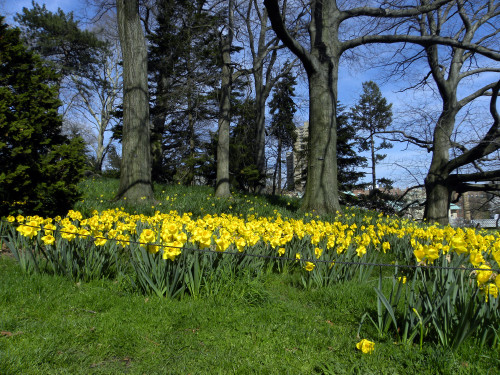 Oh, give us pleasure in the flowers to-day;
Oh, give us pleasure in the flowers to-day;
And give us not to think so far away
As the uncertain harvest; keep us here
All simply in the springing of the year.
Oh, give us pleasure in the orchard white,
Like nothing else by day, like ghosts by night;
And make us happy in the happy bees,
The swarm dilating round the perfect trees.  And make us happy in the darting bird
And make us happy in the darting bird
That suddenly above the bees is heard,
The meteor that thrusts in with needle bill,
And off a blossom in mid air stands still.
For this is love and nothing else is love,
The which it is reserved for God above
To sanctify to what far ends He will,
But which it only needs that we fulfil. —Robert Frost
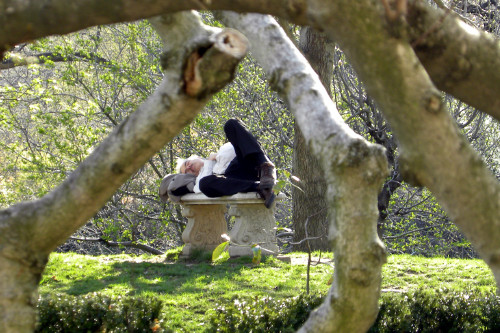 All photos taken at Brooklyn Botanic Garden by Brenda L. Becker
All photos taken at Brooklyn Botanic Garden by Brenda L. Becker
Terror of demons (and patron of candy makers), pray for us
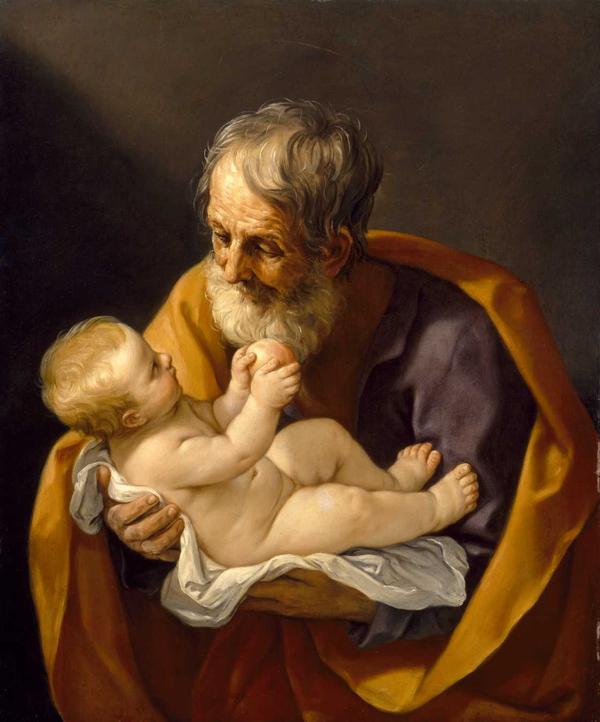 St. Joseph and the Christ Child by Guido Reni (c. 1639)Happy St. Joseph's Day! Here is a beautiful litany to St. Joseph, "foster father" of Jesus and earthly husband of Mary. "Litany" is used to denote any lengthy recitation, but its call-and-response as spoken prayer, especially in a group, can be powerful.
St. Joseph and the Christ Child by Guido Reni (c. 1639)Happy St. Joseph's Day! Here is a beautiful litany to St. Joseph, "foster father" of Jesus and earthly husband of Mary. "Litany" is used to denote any lengthy recitation, but its call-and-response as spoken prayer, especially in a group, can be powerful.
St. Joseph…pray for us.
Renowned offspring of David... pray for us (etc.)
Light of Patriarchs...
Spouse of the Mother of God...
Chaste guardian of the Virgin..
Foster father of the Son of God...
Diligent protector of Christ...
Head of the Holy Family...
Joseph most just...
Joseph most chaste...
Joseph most prudent...
Joseph most strong...
Joseph most obedient...
Joseph most faithful...
Mirror of patience...
Lover of poverty...
Model of artisans...
Glory of home life...
Guardian of virgins...
Pillar of families...
Solace of the wretched...
Hope of the sick...
Patron of the dying...
Terror of demons...
Protector of Holy Church...
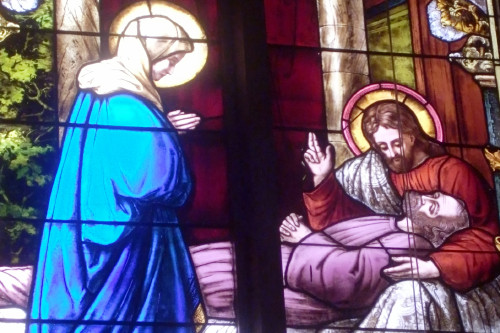 I love this tender scene of the death of Joseph, from a window in the Oratory Church of St. Boniface in downtown Brooklyn; it speaks to all of us who have nursed and lost an aging parent. Joseph is a mysterious and fascinating figure, upon whom Christians have projected all sorts of needs and desires. Scripture tells us little about the upright carpenter from Nazareth, who refused to expose Mary to shame when she was found to be pregnant before their marriage. By tradition, he is depicted as older, perhaps because there is no mention of him later in Christ's story, or to make it more credible that he remained Mary's "most chaste spouse" and she a perpetual virgin. (The lily that often accompanies his T-square is a sign of purity.)
I love this tender scene of the death of Joseph, from a window in the Oratory Church of St. Boniface in downtown Brooklyn; it speaks to all of us who have nursed and lost an aging parent. Joseph is a mysterious and fascinating figure, upon whom Christians have projected all sorts of needs and desires. Scripture tells us little about the upright carpenter from Nazareth, who refused to expose Mary to shame when she was found to be pregnant before their marriage. By tradition, he is depicted as older, perhaps because there is no mention of him later in Christ's story, or to make it more credible that he remained Mary's "most chaste spouse" and she a perpetual virgin. (The lily that often accompanies his T-square is a sign of purity.)
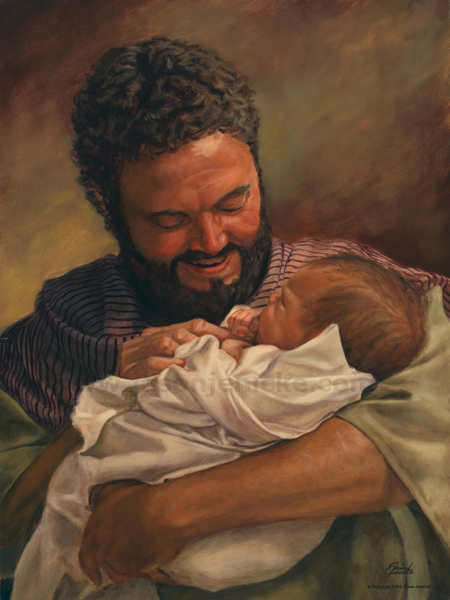 Joseph and Baby Jesus, by Jason JenickeFulton J. Sheen took issue with the depiction, arguing that Joseph was probably young and virile, "not in the evening of life, but in its morning, bubbling over with energy, strength, and controlled passion." Heck, yeah! (Catholic artist Jason Jenicke, whose work is at right, apparently agrees.) Personally, I've always wondered why Joseph and Mary had to be locked into perpetual chastity once their Redeemer Son was born; the dogma seems to spring more from the preoccupations of theologians than from Scripture or the human heart. Why couldn't they form a perfect model for human marriage in all its dimensions? (Since the Catholic blogosphere is probably divided into Those Who Couldn't Care Less and Those Who Would Be Outraged, I will pursue this speculation no further.)
Joseph and Baby Jesus, by Jason JenickeFulton J. Sheen took issue with the depiction, arguing that Joseph was probably young and virile, "not in the evening of life, but in its morning, bubbling over with energy, strength, and controlled passion." Heck, yeah! (Catholic artist Jason Jenicke, whose work is at right, apparently agrees.) Personally, I've always wondered why Joseph and Mary had to be locked into perpetual chastity once their Redeemer Son was born; the dogma seems to spring more from the preoccupations of theologians than from Scripture or the human heart. Why couldn't they form a perfect model for human marriage in all its dimensions? (Since the Catholic blogosphere is probably divided into Those Who Couldn't Care Less and Those Who Would Be Outraged, I will pursue this speculation no further.)
 Beyond his role as dad, Joseph is patron of a wild array of things, including (in addition to, of course, carpenters and fathers): confectioners, Canada, China, the dying, workers, and the Universal Church. Oh, and house-hunters. You can even buy this rubbish "kit" on the Internet and ask him to help you sell your house. (Given the Holy Family's travails on the first Christmas, I've always wondered why Joseph wasn't also the patron saint of hotel reservations.) He also gets another feast day: St. Joseph the Worker, pegged conveniently onto May Day in 1955 (take that, Commies!) Here's a bonus to tuck away for May Day; it's a bracing antidote for the Age of Dilbert.
Beyond his role as dad, Joseph is patron of a wild array of things, including (in addition to, of course, carpenters and fathers): confectioners, Canada, China, the dying, workers, and the Universal Church. Oh, and house-hunters. You can even buy this rubbish "kit" on the Internet and ask him to help you sell your house. (Given the Holy Family's travails on the first Christmas, I've always wondered why Joseph wasn't also the patron saint of hotel reservations.) He also gets another feast day: St. Joseph the Worker, pegged conveniently onto May Day in 1955 (take that, Commies!) Here's a bonus to tuck away for May Day; it's a bracing antidote for the Age of Dilbert.
Prayer to St. Joseph, Patron of Workers
Glorious Saint Joseph, you are the pattern of all who work. Obtain for me, please, the grace to work conscientiously and to put devotion to duty before my selfish inclinations.
Help me to labor in thankfulness and joy, for it is an honor to employ and to develop by my labor the gifts I have received from almighty God.
Grant that I may work in orderliness, peace, moderation and patience without shrinking from weariness and difficulties. I offer my fatigue and perplexities as reparation for sin.
I shall work, above all, with a pure intention and with detachment from self, having always before my eyes the hour of death and the accounting which I must then render of time ill-spent, of talents unemployed, of good undone, and of empty pride in success, which is so fatal to the work of God.
For Jesus through Mary, all in imitation of you, good Saint Joseph. This shall be my motto in life and in death. Amen.
Saint Patrick's Body Armor
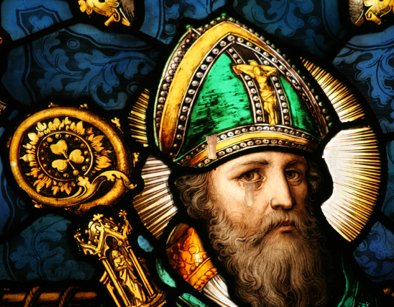 I crafted this image as a response to the heartbreaking revelations that have brought the Catholic Church in Ireland to its knees. My meditation on what it meant to me as a third-generation Irish-American is here. But today is not a day for pain and shame and disillusionment.
I crafted this image as a response to the heartbreaking revelations that have brought the Catholic Church in Ireland to its knees. My meditation on what it meant to me as a third-generation Irish-American is here. But today is not a day for pain and shame and disillusionment.
The faith of Ireland sustained its people, but so did their own fathomless resilience, wildness and imagination. All of it comes together in the legendary prayer of St. Patrick called the Lorica, a word that literally means "body armor" and is sometimes translated as "breastplate." It's more an incantatory poem than a prayer, a shaman's thing. The redoubtable Father Z sums it up: "The Lorica of St. Patrick is rooted in an unconfused belief in the supernatural dimension of our lives, that there is a spiritual battle being waged for our souls, and in our absolute dependence on the One Three-Personed God." As my daughter prepares to march with her school in the granddaddy of all St. Patrick's Day parades here in New York today, all I can say is: Strap it on.
(Is it long? Oh yes, this is the full version. Want to kick your CCD class into high gear? Have the kiddies do a round-robin reading of this, instructing them first to read each line like their favorite superhero.)
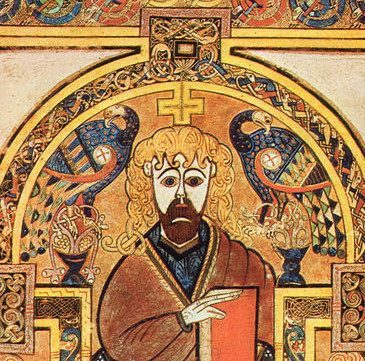 The Book of Kells, detailThe Lorica of St. Patrick
The Book of Kells, detailThe Lorica of St. Patrick
I arise today
Through a mighty strength, the invocation of the Trinity,
Through a belief in the Threeness,
Through confession of the Oneness
Of the Creator of creation.
I arise today
Through the strength of Christ's birth and His baptism,
Through the strength of His crucifixion and His burial,
Through the strength of His resurrection and His ascension,
Through the strength of His descent for the judgment of doom.
I arise today
Through the strength of the love of cherubim,
In obedience of angels,
In service of archangels,
In the hope of resurrection to meet with reward,
In the prayers of patriarchs,
In preachings of the apostles,
In faiths of confessors,
In innocence of virgins,
In deeds of righteous men.
I arise today
Through the strength of heaven;
Light of the sun,
Splendor of fire,
Speed of lightning,
Swiftness of the wind,
Depth of the sea,
Stability of the earth,
Firmness of the rock.
I arise today
Through God's strength to pilot me;
God's might to uphold me,
God's wisdom to guide me,
God's eye to look before me,
God's ear to hear me,
God's word to speak for me,
God's hand to guard me,
God's way to lie before me,
God's shield to protect me,
God's hosts to save me
From snares of the devil,
From temptations of vices,
From every one who desires me ill,
Afar and anear,
Alone or in a mulitude.
I summon today all these powers between me and evil,
Against every cruel merciless power that opposes my body and soul,
Against incantations of false prophets,
Against black laws of pagandom,
Against false laws of heretics,
Against craft of idolatry,
Against spells of women and smiths and wizards,
Against every knowledge that corrupts man's body and soul.
Christ shield me today
Against poison, against burning,
Against drowning, against wounding,
So that reward may come to me in abundance.
Christ with me, Christ before me, Christ behind me,
Christ in me, Christ beneath me, Christ above me,
Christ on my right, Christ on my left,
Christ when I lie down, Christ when I sit down,
Christ in the heart of every man who thinks of me,
Christ in the mouth of every man who speaks of me,
Christ in the eye that sees me,
Christ in the ear that hears me.
I arise today
Through a mighty strength, the invocation of the Trinity,
Through a belief in the Threeness,
Through a confession of the Oneness
Of the Creator of creation.
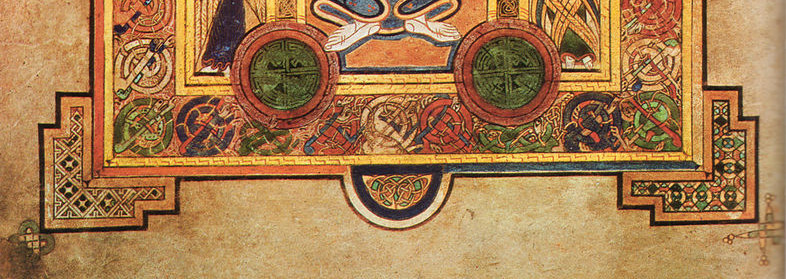
We set out famished
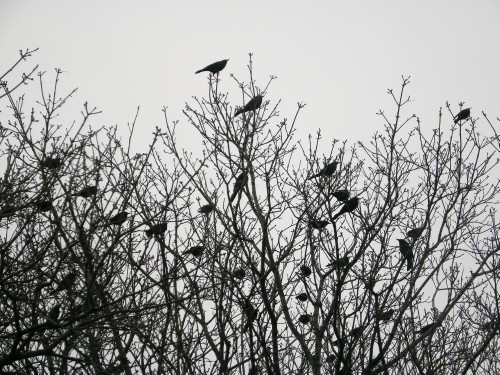
It wouldn't be a Lenten resolution without falling off the wagon. After a few days of more worldly blogging, I was reminded of spiritual concerns by this raucous backyard flock of grackles (I think they're grackles, from their tails). Not sure why; something about the gray sky and slightly ominous birds said "Repent, you ADD-afflicted sloth." Hey, I said they were raucous.
Since I've been thinking (okay, moping) lately about what I Really Want to Be When I Grow Up...and wondering why I am still having this conversation past my half-century mark...I decided to look for prayers of discernment. In secular terms, a "discerning eye" means, say, being able to tell natural fiber from polyester at 20 paces; in Catholic parlance, discernment is often shorthand for recognizing a vocation to the priesthood or convent. But the deeper meaning implies being open to learning God's will for your life. It's not so much squinting to discern a pattern, as shutting up and listening for a whisper (or, occasionally, a studiously ignored holler).
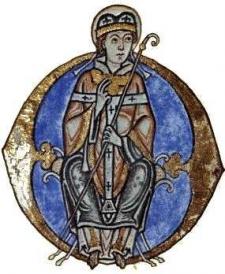 St. Anselm of CanterburyThe Thomas Merton prayer with which I began Lent is, indeed, a good start, from a place of not-knowing. Spiritual Googling turned up two prayers by St. Anselm that express a hunger for God's presence and guidance. Anselm was an Italian Archbishop of Canterbury who discerned the need to bust the chops of the king of England after the Norman Conquest. But first, the prayers.
St. Anselm of CanterburyThe Thomas Merton prayer with which I began Lent is, indeed, a good start, from a place of not-knowing. Spiritual Googling turned up two prayers by St. Anselm that express a hunger for God's presence and guidance. Anselm was an Italian Archbishop of Canterbury who discerned the need to bust the chops of the king of England after the Norman Conquest. But first, the prayers.
St. Anselm Prayer for Discernment I
O Lord, my God, teach my heart this day where and how to see you, where and how to find you.
You have made me and remade me, and you have bestowed on me all the good things I possess, and still I do not know you. I have not yet done that for which I was made.
Teach me to seek you, for I cannot seek you unless you teach me, or find you unless you show yourself to me.
Let me seek you in my desire; let me desire you in my seeking. Let me find you by loving you; let me love you when I find you.
St. A Prayer for Discernment II
O Lord: my heart is made bitter by its own desolation; sweeten it by Your consolation.
I beseech You, 0 Lord, that having begun in hunger to seek You, I may not finish without partaking of You. I set out famished; let me not return still unfed.
St. Anselm, Royal-Butt-Kicking Archbishop of Canterbury
How did I never hear of this guy? Here's a good thumbnail from the blog Communio:
Saint Anselm is a towering figure in monastic, theological and philosophical circles whose works take diligence in getting your mind around. [Ah, that's how I never heard of him.--Ed.] Even centuries later he speaks with precision. Saint Anselm of Canterbury (c. 1033-1109) an Italian by birth, held various academic and ecclesial titles; he was the archbishop of Canterbury from 1093 until his death in 1109. The Church tells us he is the father of scholasticism and famous for the ontological argument for God's existence.
 Meditations of St. Anselm, 12th Century manuscript (WGA)My mind shuts down at the word "ontological," but Anselm also "created a tradition of intimate, intensely personal prayer" according to this collection of his works. And he had far more secular wranglings with King William II, the son of William the Conqueror. Their royal versus ecclesial tug-of-war was classic medieval politics-as-usual, made famous later by Becket and then again by Henry VIII.
Meditations of St. Anselm, 12th Century manuscript (WGA)My mind shuts down at the word "ontological," but Anselm also "created a tradition of intimate, intensely personal prayer" according to this collection of his works. And he had far more secular wranglings with King William II, the son of William the Conqueror. Their royal versus ecclesial tug-of-war was classic medieval politics-as-usual, made famous later by Becket and then again by Henry VIII. 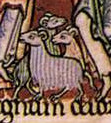 Anselm seems to have put Canterbury on the map as the seat of church authority in England, long before that nasty business with the Boleyn wench broke things off with Rome. Anselm was canny but implacable when it came to ceding power to the king, and he also worked zealously to implement reforms in the church, including clerical celibacy. (Yes, that was a reform.)
Anselm seems to have put Canterbury on the map as the seat of church authority in England, long before that nasty business with the Boleyn wench broke things off with Rome. Anselm was canny but implacable when it came to ceding power to the king, and he also worked zealously to implement reforms in the church, including clerical celibacy. (Yes, that was a reform.)
 Rowan Williams, Archbishop of Canterbury (NY Times)Funny, just after learning all this, I read that today's Archbishop of Canterbury, Rowan Williams, is resigning, after a tenure marked by agonized wimpy attempts to make everyone in the dwindling, schism-racked Church of England play nicely together. Here is Rowan with his boss, the head of his mostly-empty-these-days Church. I like to think that Anselm, with his discerning eye, would have noted that their only clash was sartorial.
Rowan Williams, Archbishop of Canterbury (NY Times)Funny, just after learning all this, I read that today's Archbishop of Canterbury, Rowan Williams, is resigning, after a tenure marked by agonized wimpy attempts to make everyone in the dwindling, schism-racked Church of England play nicely together. Here is Rowan with his boss, the head of his mostly-empty-these-days Church. I like to think that Anselm, with his discerning eye, would have noted that their only clash was sartorial.